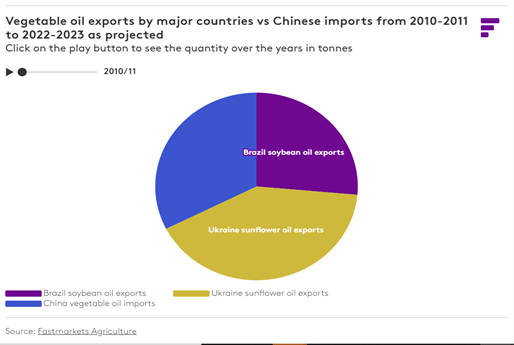What is causing today’s vegetable oil crisis and the rise in demand for soybean oil?
In this report, we answer the top three questions we’re hearing from the market:
- What does the vegetable oil market look like today?
- What is causing the veg oil crisis and what opportunities are there for importers?
- Soybean oil demand is on the rise and production forecasts are optimistic. Can this alleviate supply strain in other cooking oils and biofuel feedstocks?
Geopolitical instabilities, extreme weather and political decisions driven by inflationary pressures are all contributing to today’s vegetable oil crisis.
As climate change becomes more tangible and periods of draught more frequent, major vegetable oil producers struggle to meet export and domestic demand, with yields being challenged and forecasts uncertain.
Importers, who have previously relied on sunflower oil supply from Ukraine, are now cautious in their purchases and concerned because, despite the recent free grain corridor agreement, shipments from the Black Sea may still struggle to depart while the war continues.
And the crisis expands to all agricultural commodities, not just oils.
A shortage in fertilizer, exported mainly from Russia, means that corn and wheat are also difficult to grow and may have to be substituted with crops that require less nourishment, like soybeans. US and Canadian farmers have already started to adapt to this.
With optimistic production forecasts for soybeans, at least in North America, soybean oil is a good candidate to alleviate the scarcity of other vegetable oils and is the most significant feedstock option for biodiesel.
Click here to access 6 interactive charts showcasing:
- Vegetable oils global export/import data and forecasts (Brazil, China Ukraine from 2011-2012 to 2022-2023)
E.g.:

- Indonesian palm oil export data
- US soybean oil production and forecasts
- US and global soybean oil demand data
- US soybean oil demand forecasts
- Biodiesel margins over soybean oil fixed and variable cost data